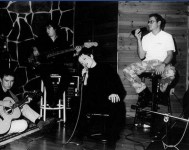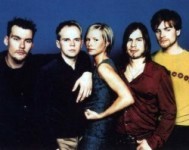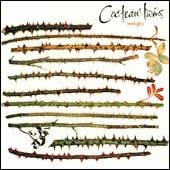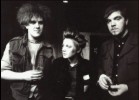"my music has been evolving slowly. when I was in Beijing, I only listened to cultural folk songs.then Teresa Teng became popular and I listened to her songs. it was only when I came to Hong Kong that I heard r&b and my first few albums are very influenced by that sound.there is so much variety in music genres in Hong Kong and as my musical knowledge grew, my style also changed."
Faye Wong has been influenced by many famous figures throughout her career as a singer. she has gone through various changes during her singing career, from the cocteau twins, to the Icelandic pixie björk, to the ever sensational Teresa Teng, to the pop group the cardigans, to the indie group, the cranberries. however she has been labeled as a copycat but I do not think so as when she was still a greenhorn in the entertainment industry she needed ideas and suggestions to make her more outstanding and to gain attraction from the media. nonetheless Faye Wong has "mimicked" their strange get-ups and vocal styles and was given harsh comparisons to the real McCoy. over the years, Faye Wong has developed a style of her own. now the tables are turned and certain singers are now given the harsh treatment of comparison with the now real McCoy, Faye Wong.
the influences...[from left to right] the cranberries the cardigans, Teresa Teng, cocteau twins, Sinead O'Connor





 It's often said that rock music can only be defined by
its limitations. If that's the case, it's no wonder that, for 13 years, writers have had
such a hard time describing the Cocteau Twins. In June 1983, the release of the band's
debut album tossed those so-called limitations into the twilight zone and the Cocteau
Twins have been pushing the celestial envelope ever since.
It's often said that rock music can only be defined by
its limitations. If that's the case, it's no wonder that, for 13 years, writers have had
such a hard time describing the Cocteau Twins. In June 1983, the release of the band's
debut album tossed those so-called limitations into the twilight zone and the Cocteau
Twins have been pushing the celestial envelope ever since.
It all began in 1982, when Robin Guthrie and Elizabeth Fraser moved to London from their hometown of Grangemouth, Scotland. A year later, they signed to a nascent independent record company called 4AD (a label they later defined) and released their first album, Garlands. This first effort collided introspective, dissonant guitars, a post-punk soundscape, and a TR808 electronic drum machine, all of which incited a fanfare of praise and wonder usually reserved for biblical events. This was largely because Fraser's soaring voice lifted the post-industrial clang heavenward and into the supernatural (and a terrestrial #2 position in the UK independent charts). The follow-up in August 1983, Head Over Heels, saw them hailed as one of the chosen independent British bands, who, along with the likes of Depeche Mode and the Cure, helped shape the early '80s music scene. Robin and Elizabeth's cover of Tim Buckley's "Song to the Siren," recorded as part of 4AD's This Mortal Coil project, only reinforced their reputation as masters of the ethereal.
By the end of 1983, the duo had recruited bassist Simon Raymonde from a band called the Drowning Craze, and sped into '84 with a UK hit single called "Pearly-Dewdrops Drops. " They also recorded Treasure, an album filled with such sublime eargasms, it prompted one misguided journalist to conclude in a review that "Surely this is the voice of God." Three EPs containing yet more material all raced up the British charts and proved that musically, the band was capable of expanding both outward and upwards.
Although the band now refute accusations that they've spent much of their career being willfully obscure, there's no doubt they've picked a path of greatest resistance: rarely releasing singles to trail forthcoming albums, touring only when it was least expected, staying clear of virtually all TV appearances and giving nothing away at interviews. Just when they were in a position to capitalize on the success of Treasure, Robin, and Liz recorded the acoustic Victorialand (1986) and the band followed this with The Moon and the Melodies -- a collaboration with minimalist jazz pianist Harold Budd.
Their debut album for Capitol, Blue Belle Knoll, proved that the Cocteau Twins were one of the few British bands to survive the '80s with their reputation pretty much intact. Although their success in the U.K. has never been properly mirrored in America, their influence permeates through today's avant garde, from the textured rhythms of the Chemical Brothers, to the ambient techno of Seefeel (Mark Clifford produced the Twins' recent EP "Otherness").
Throughout the years, the Cocteau Twins remained a closed book. The band's lyrics were virtually unintelligible (for years, the only printed lyrics was the couplet, "When mama was moth/I took bulb form"), and in person, they made even less sense. The band's dogged refusal to allow anyone into their hermetically sealed world managed to frustrate even their most ardent supporters. All meetings with the band were conducted in an atmosphere of trust and understanding -- the band didn't trust people and people didn't understand the band. "We always thought there was something to hide," Simon now explains. "We second-guessed so much, we acted as though there was some dark secret. After all, all these journalists, who had all these degrees were asking us the same question, so I think we invented this mystery, this oddness, to give us a personality. This is all said with hindsight," he adds. "At the time, we had no masterplan to be odd."
The Cocteau Twins began the Nineties with the same gush of critical plaudits they'd received a decade before with the album, Heaven or Las Vegas. To celebrate the album's title, the band finished the tour at the Las Vegas casino Aladdin (heaven was fully booked at the time). In 1991, the band finally parted company with 4AD in the U.K. and, two years later, released Four-Calendar Cafe.
No one has ever found a magic formula that somehow links a music that's been described as the iridescent flutter of angels wings, to three human beings who have spent many years going through personal hell (the band nearly split up in 1994 because, as Raymond recalls, "We got about as low as you could go, personally and emotionally, but we've come out the other end a lot healthier. Things are brilliant now"). It's perhaps the Cocteau Twins' ability to feast on these contradictions that keeps their music so charged.
Just after the Four-Calendar Cafe World Tour ended, Guthrie went to Brittany to write new songs. There he was later joined by Simon and Liz. The trio then adjourned to their studio in Twickenham, a leafy London suburb, where they recorded the songs together -- the first time the band had been in the studio at the same time since Treasure. "Maldng this record was a very joyous experience," Robin elaborates. "It only took two months to record, which for us is amazing. We'd always read articles about bands who spoke of the vibe of the band in the studio and we'd have no idea what they were talking about. We t ioug t it was o s ecause way of worldng was so alien to us. Simon used to come into the studio in the daytime to do his thing, then I would come in at night to do mine, and then Liz would come in when neither one of us was around. We were never in the studio at the same time. This time, we really were together much of the time."
The result is Milk & Kisses, the band's ninth album (their fourth for Capitol). It is very much a Cocteau Twins album (which prompts the band to ask, "What do people expect from us? A rap album?"), yet we are presented with a very different trio -- a band who fully understand their combined strengths and individual weaknesses, whose music sets out to describe the entire spectrum of emotions from distorted sorrow to searing joy. Elizabeth Fraser sees this album as more exaggerated than any of the albums. Very, very sad and more honest than ever." The singer may claim that this album is more grounded in real life with lyrics culled from her daily journal, yet Fraser's voice continually challenges the very notion of reality. On Milk & Kisses, her intoxicating chant has the brittle strength to melt the hardest of hearts. It's a voice that clearly demonstrates that all that early purple prose about angels and iridescence, although embarrassing to the band, may not have been completely off the mark. Like its two predecessors Heaven Or Las Vegas and Four Calendar Cafe, the lyrics on Milk & Kisses are half discernable lyrics, half a phonetic stream of unconsciousness.
"I know we make great pieces of music, great atmospheres," Guthrie explains, "but I wanted to see if we wrote real songs." The answer is a resounding yes. Milk & Kisses is without doubt their most assured work to date, at times ("Half-Gifts, "Rilkean Heart," and the astounding "Treasure Hiding") soaring with the same dangerous beauty as the very best of Treasure or Victorialand.
Since recording the album last May, the band has been amazingly productive. They wrote a song for the Judge Dredd movie soundtrack, and have written various TV commercials (for the health drink Aqua Libre and Fruitopia in Britain, cars in Japan, and a toothpaste in Spain). In September of 1995 "Twinlights, " a largely acoustic EP, was released followed by the more ambient "Otherness" EP in December. An eight-minute film made by Dirk Van Dooren to accompany the "Twinlights" EP won the Grand Jury Prize at the Charleston International Film Festival.
Although the two EPs were released before the album, they were written after it, which is just the sort of upside-down behavior you'd expect from the strangely strange yet oddly normal Cocteau Twins. The band are currently planning a world tour this year which they hope will visit more intimate venues than their last American adventure.
They say that beauty is in the eye of the beholder. Well, it's 1996, so behold... the Cocteau Twins!
Pictures
what can I say? they may seem a little not as fashionable as Faye but sometimes, Elizabeth really reminds me of Na Ying. Liz has one of the coolest hairstyle and some of the dorkiest hairstyle I have ever seen, my some of this picas were way back in the 80's so no wonder they aren't hip as Faye! hehe Faye also has some horrible looks too!
click on pic to enlarge
Links
björk guðmundsdóttir, daughter of hildur hauksdóttir and gudmundur gunnarsson, was born november 22 1965. she had three sisters and three brothers by three different mothers and three different fathers. wow! from the age of 6 to 14 she went to Reykjavik's music school. there she learnt to play the piano and the flute. she released her first albums soon as 1977, only 11 years old.It contains songs with covers of for example Stevie Wonder and The Beatles and Icelandic singers in a seventies style. As a child she was sometimes a bit of a loner, the other children would sometimes tease her because of her oriental appearance,which is uncommon in Iceland, and she was often called "chinagirl". She learned to manage on her own and became a strong individual.
björk like Faye Wong also have some quotable quotes. here are just a couple.
"I am going to make albums as long as I can and I am not going to care about that the record company wants me to wait two or three years between the albums. I decide and if I want to do three albums a year I will!" - björk "
I will probably make a good album by the time I'm 80" - björk
More Info on the Cranberries Coming Up




